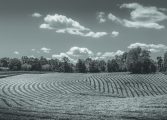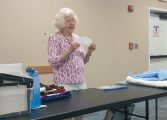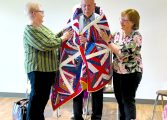By Page H. Gifford
Correspondent
Building on the online success of the play “The Niceties,” the Fluvanna County Arts Council continues its virtual season with world-class jazz musician Victor Haskins. The FCAC is excited to bring back jazz after its absence in the last few years.
Jazz is unique to the African-American culture and experience and musicians like Haskins not only delve into the roots and the history to extract tones and sounds but also the emotion. It is the emotion, the movement of music itself that drives Haskins’ unique musical style, and what he teaches to his students.
Haskins is a professor of jazz trumpet and the director of the Jazz Ensemble at the College of William and Mary. He is also an outstanding electronic wind instrument player. He is known as an improvisational musician, composer, and arranger. He has taught master classes at many prestigious colleges and universities and is the director of Jazz Outreach for the John F. Kennedy Center for the Performing Arts.
Haskins grew up in a variety of places overseas while his mother was in the Air Force in Hong Kong, Kuala Lumpur, Lusaka, New Delhi. His mother retired from the Air Force when he was in seventh grade and the family settled in Stafford, Va. In some of the areas Haskins lived in, the cultural aspects of the native music can be heard in some of his original jazz compositions. “Touch” from his album “Showing Up” has an Asian flavor cleverly blended with mellow jazz. “Grey” is reminiscent of the style of Chuck Mangione, rhythmical, flowing, easy and contemporary. Some may view Haskins as progressive but his music is light and breezy, easy on the mind, and lifts the spirit.
“Research sometimes plays a large role in the creation and performance of a work. Having real knowledge that comes from a variety of sources can be vital to reinforce one’s instinct to make the right or best choice,” he said. This could be said of his original works which have an Asian or African influence. “This is especially true in an improvisational context. This might mean researching a technique or studying history. It could also mean looking within and gaining a deeper understanding of some aspect of the self. Or perhaps, some mixture of these parts.”
“I became interested in music when I started playing the cornet in a band during my last year in New Delhi in the 6th grade. I simply fell in love with practicing and playing the instrument,” he said. He adds that Woody Shaw, Wayne Shorter, Bunky Green, Greg Osby were jazz musicians who influenced him.
He is the master of improvisational jazz. It is a spontaneous process. Haskins creates new melodies while continuously repeating a cycle of chord changes of a tune. Those that are melody purists often find progressive or improvisational jazz jarring. For some listeners, it can be an acquired taste but Haskins like many of his predecessors have their niche and those who are willing to listen.
“Improvisation is at the heart of my practice as an artist and creator. Improvisation is the most authentic manner of connecting with other people and transmitting ideas and emotions,” he said. “In my definition of improvisation, one must have a high level of ability in executing actions guided by emotions, intellect, and spirituality, and an even higher level of ability in perceiving, processing, and responding to stimuli, both internal and external. The synthesis of these factors results in consistently inspired, intentional improvisational experiences.”
His auditory interplay is deep and complex but so is most art whether it is seeing or listening. Haskins’ improvisations create energy and intricate infrastructure with sound and emotion resulting in unique soundscapes.
“Whether I am composing music for an improvising ensemble, or designing an improvisational, multidisciplinary presentation, he focuses on form as it relates to content.”
Haskins knows that any form of art takes on a life of its own and he passes this on to his students.
“I hope my students understand the power of studying a creative endeavor such as music. There are a variety of benefits to be reaped by engaging with this creative outlet, depending on one’s proclivities and how deep they wish to dive,” he said. “The practice of music serves to raise our capacity for attention. This makes us think more deeply and absorb ideas and emotions more sensitively.”
As for his virtual performance for Carysbrook Performing Arts Center, he says, “I look forward to creating the experience.” The concert is a free event streaming live on Facebook on Nov. 21, at 5 pm. Visit Carysbrook Performing Arts Center on Facebook for the link and other information. If you would like to donate, please visit the website at www.carysbrook.org.




